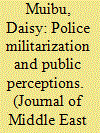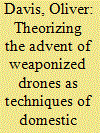| Srl | Item |
| 1 |
ID:
185068


|
|
|
|
|
| Summary/Abstract |
This introduction to the special issue ”Global Counterinsurgency and the Police-Military Continuum” examines the emergence of global counterinsurgency in the twentieth century and introduces the critical concept of the police-military continuum. Through a review of the recent literature, it also provides a framework for analyzing the relationship of historical trends and contemporary developments in what is typically labeled ”police militarization.” It introduces and summarizes the fourteen original research articles in the special issue, which analyze United States, United Kingdom, Costa Rica, Haiti, India, Kenya, Malaysia, Tanganyika, and elsewhere. The introduction explains the genesis of the special issue in the aftermath of the rebellions of 2020, and it also considers new directions for research in the aftermath of the events of 6 January 2021 at the US Capitol, as well as what these events indicate about counterinsurgency’s possible future mutations.
|
|
|
|
|
|
|
|
|
|
|
|
|
|
|
|
| 2 |
ID:
180654


|
|
|
|
|
| Summary/Abstract |
How can one encourage greater public cooperation with police forces and improve their legitimacy during times of protracted conflict and fragile governance? Can police militarization play a role in improving public perceptions toward law enforcement in these contexts? The prevailing perception is that police militarization undermines public opinion toward the police. Yet, there has been little empirical evaluation of the impact that militarization has on public attitudes in conflict-affected regions. Relying on original survey data collected in the city of Kismaayo, Somalia, this study examines the impact that perceived police militarization has on public perceptions toward a newly introduced police force operating in a region with an active insurgent-terrorist threat. Results of regression analysis and qualitative field interviews suggest that militarization can actually improve residents’ willingness to cooperate with the police, as well as perceptions of police legitimacy. The perceived militarization of this nascent police force conveys a level of preparedness and professionalism to residents exposed to decades of conflict.
|
|
|
|
|
|
|
|
|
|
|
|
|
|
|
|
| 3 |
ID:
167410


|
|
|
|
|
| Summary/Abstract |
The killing of Micah Johnson by Dallas police using a teleguided exploding robot on 8 July 2016 is the first known example of the use of a killer drone by US law enforcement in the domestic arena. This repatriation of the drone, under conditions of racialized urban unrest designated as exceptional, was predicted by Didier Bigo and follows a familiar pattern whereby coercive security technologies are tested abroad before finding their way ‘home’ to arm police forces that are becoming increasingly paramilitary in style and conduct. I use the Dallas incident to probe the cogency and limits of ‘drone theory’ and to consider its application in domestic policing contexts. I work through three broadly delineated areas of scepticism about drone theory as it intersects with policing and, in so doing, develop my own account of the weaponized policing drone as a defining techno-cultural element within the emergent form of neoliberal political rationality I call ‘governance’.
|
|
|
|
|
|
|
|
|
|
|
|
|
|
|
|